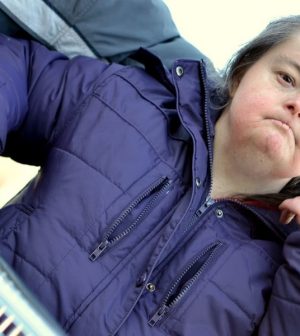- Recognizing the Signs of Hypothyroidism
- 10 Strategies to Overcome Insomnia
- Could Artificial Sweeteners Be Aging the Brain Faster?
- Techniques for Soothing Your Nervous System
- Does the Water in Your House Smell Funny? Here’s Why
- Can a Daily Dose of Apple Cider Vinegar Actually Aid Weight Loss?
- 6 Health Beverages That Can Actually Spike Your Blood Sugar
- Treatment Options for Social Anxiety Disorder
- Understanding the Connection Between Anxiety and Depression
- How Daily Prunes Can Influence Cholesterol and Inflammation
People With Intellectual Disabilities at High Risk for Fatal COVID-19

Having an intellectual disability is second only to being elderly as a risk factor for dying from COVID-19, a new study suggests.
“The chances of dying from COVID-19 are higher for those with intellectual disability than they are for people with congestive heart failure, kidney disease or lung disease,” said study author Dr. Jonathan Gleason, chief quality officer at Jefferson Health, in Philadelphia.
“That is a profound realization that we have not, as a health care community, fully appreciated until now,” he said in a Thomas Jefferson University news release.
For the study, Gleason and his colleagues analyzed 64 million patient records from 547 U.S. health care organizations between January 2019 and November 2020. Compared to the general population, people with intellectual disabilities were 2.5 times more likely to contract COVID-19, were about 2.7 times more likely to be admitted to the hospital and 5.9 times more likely to die from COVID-19.
The study was published online recently in the New England Journal of Medicine.
People with intellectual disabilities account for 1% to 3% of the U.S. population.
Study co-author Dr. Wendy Ross is director of the Center for Autism and Neurodiversity at Jefferson Health. She said, “Our failure to protect these deeply vulnerable individuals is heart-breaking. I believe that if we can design a system that is safe and accessible for people with intellectual disabilities, it will benefit all of us.”
People with intellectual disabilities may be less able to follow infection-prevention measures such as masking and social distancing, according to the researchers.
Also, they’re more likely to have other health problems that contribute to more severe COVID-19.
“We need to understand more about what is happening with these patients,” Gleason said.
“I do believe these patients and their caregivers should be prioritized for vaccination and health care services. We should reflect on why we have failed this vulnerable population, and how we can better serve them during this health crisis, and into the future,” Gleason suggested.
“Even prior to the pandemic, individuals with intellectual disabilities have had poor health outcomes. We need to do much better,” he added.
More information
The U.S. Centers for Disease Control and Prevention has more on people at increased risk from COVID-19.
SOURCE: Thomas Jefferson University, news release, March 5, 2021
Source: HealthDay
Copyright © 2026 HealthDay. All rights reserved.










